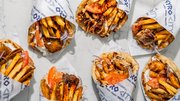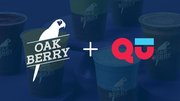Article
Fast casual operators find retail success
Producing and packaging your proprietary goods is one way to develop another revenue stream.

December 13, 2009 by Cary Stemle — Free-lance reporter, N/A
From its inception in 1994, Jacksonville, Fla.-based Firehouse Subs has offered several dozen hot sauces, free, at the counter. But they soon realized customers had taken a particular shine to one made from datil peppers, widely grown in the Florida region, and so they soon began selling it in bulk, letting customers fill up a jug and take it home.
Nearly 25 years later, the company took the datil pepper hot sauce to the next level. Captain Sorenson's Datil Pepper Hot Sauce is now sold in glass bottles shaped like a fire hydrant (the design won a top prize from the Food Service Packaging Institute in 2008). Currently it's the only branded product Firehouse sells, and is available only in the restaurants.
The sauce is profitable, said Don Fox, Firehouse's chief executive officer, but that's not the primary rationale. "Hot sauce is not our main focus — selling sandwiches and soft drinks and chips is," he said. "Our sales are fairly modest. We have a lot more to gain from the standpoint of brand recognition."
At Mandola's Italian Market, a new concept co-founded in 2005 by Damian Mandola (Carrabba's Italian Grill), the focus is on serving house-made food in a market setting, based on the Italian markets in New York's Little Italy or Boston's North End.
The market in Austin, Texas, now sells sauces and wine with the Mandola label, and plans to slowly broaden its offerings. "It wasn't part of the original concept," said company president Michael Share, "but it was such a natural extension of our product line."
Whether the products become a significant profit center is still to be determined, he said, but he thinks the private label goods will aid in building the new brand. "We don't have a strong brand yet, but we feel we have a strong product," he said. "As the concept grows, we think (the private label) will really help."
Bright beginnings
It seems like a no-brainer. Your fast casual restaurant makes a product your in-store customers love. So why not package it for retail sale in your store to drive revenue and, perhaps more importantly, extend your brand?
"It's a good question," said Susan Pecuch, a Florida retail consultant. "If I take your salad dressing home and serve it to someone, I'm actually promoting your brand."
Though many fast casual restaurants have made the leap to selling their own branded products in their own stores, many still do not. She speculates there are several reasons why. Some may avoid retail sales "because it twists their basic business model or they may fear cannibalizing their own business," she said. Or "they may not have the experience and team to take on their own line."
Coffee companies have long understood they can sell you a cappuccino or latte and some beans to take home or to the office. Rather than cannibalizing sales, Caribou Coffee sees its retail offerings as an effective way to cross-promote.
"It drives sales as folks become more familiar (with) new coffee origins and blends, and teas and chocolate," Alfredo Martel, senior vice president of marketing, said. For example, after Caribou rolled out its 2009 Amy's blend collection, which includes coffee, tea, reusable totes and themed merchandise, sales increased 36 percent for the overall program and were positive in all categories, including coffee beans.
Then there's Barnie's Coffee & Tea Co., a 30-year-old specialty coffee company that puts nearly equal emphasis on retail goods. Founder Phil Jones, who sold the company in 1998 and bought it back in early 2008, likens Barnie's more to Williams-Sonoma than Starbucks.
Barnie's stores display equipment and other merchandise and sell a private label line of coffee, tea and cocoa, plus flavoring syrups and an iced-coffee concentrate.
"When we started in 1980, this is what we were know for," Jones said. "We've always been oriented toward people buying it to take home and brew."
Clearly, selling your own brand of goods presents challenges. Jones cited staff training and said production chains are "under distress" from the credit crunch. "The whole thing is a kind of a floating loan with a lot of leverage all through the process," he said.
Caribou's Martel noted increased inventory carrying costs and more SKUs to track while Fox said it may cause discord among franchisees.
Then there's production.
"It's one thing to make tomato sauce and put it in a to-go container," Share said. "That's easy. It's a whole different animal to put it in a jar and label it and sell it on our grocery shelves."
But Pecuch said that with today's changing dynamics, including increased online sales, companies must constantly reconsider everything they do. For example, many restaurant owners were initially skeptical of drive-thrus. "Only a few did it early on," she said. "Now they're standard."
Correction: Due to a reporter's error, this story previously contained erroneous information about the founding of Mandola's Italian Market. This version is correct.












